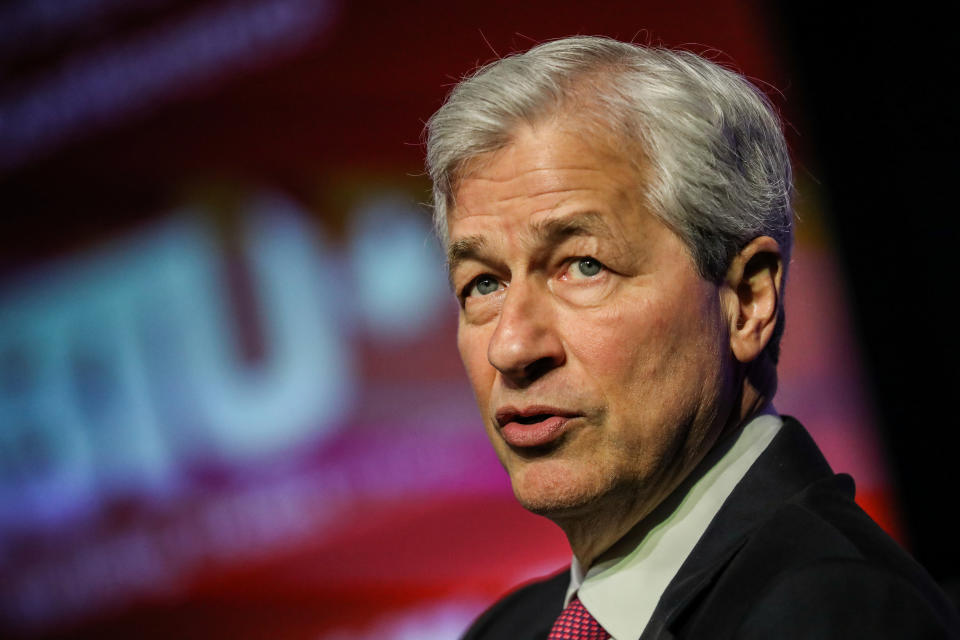CEOs say trade uncertainty is biggest concern for US economy
Cummins CEO Tom Linebarger and JPMorgan Chase (JPM) CEO Jamie Dimon say their biggest economic worry — at the moment — is trade uncertainty.
“I think the biggest self-inflicted risk to growth today would be trade going south,” said Dimon.
Dimon, Linebarger and IBM (IBM) CEO Ginni Rometty spoke to reporters during a Business Roundtable discussion in Washington this week.
The Business Roundtable, a lobbying group of CEOs, released a survey on Wednesday that showed while chief executives are still optimistic about the economy, their outlook is weakening amid trade concerns.
“I think trade is the scariest area. We have been the most successful trading economy ever — that ever existed — and we built many of our companies on the back of being successful internationally,” said Linebarger. “So stopping us from competing would be the worst damage to the U.S. economy.”
Linebarger said 5,000 jobs at Cummins alone are dependent on global trade.
The Cummins (CMI) CEO, who leads the Business Roundtable’s trade committee, said trade uncertainty could be damaging to the U.S. economy in the short and long term. He said businesses are already feeling the impact of trade tensions with China.
“I think the tariffs that are in place now — and may be in place for some time — are a significant burden on U.S. companies and farms. They will be for some time. I’m really concerned about that impact it has on our economy and the Chinese economy for that matter,” said Linebarger.
Linebarger said the cost of the China tariffs have already outweighed the benefit Cummins received from the 2017 tax cuts. He said Cummins, which manufactures engines, has lost a small amount of business and, along with other companies, is looking to find new suppliers outside of China.
“We export a small number of engines from China, and because we could not find a new source for those, we essentially lost that business. But I would say that’s the beginning — the tip of the iceberg. More will come on that front,” said Linebarger.
While the executives agreed with the need for China to make structural changes, they worry about the impact of additional tariffs.
Increase in volatility, risk of downturn
“This tit-for-tat back and forth, threats back and forth will increase volatility and decrease growth,” said Linebarger.
“We’re not generally in favor of tariffs. We can say it 100 times in 100 ways,” said Dimon.

If President Trump moves forward with the next round of 25% tariffs on Chinese goods, Dimon said it will hurt business confidence.
“It adds to the risk of pushing into a downturn,” said Dimon. “It’s just raising the risk of a bad outcome. That’s all it does.”
Linebarger stressed the need for the U.S. to convince China to make structural changes.
“The U.S. needs to make sure we’re working with our allies to put pressure on the Chinese government to make the changes, because they’re not easy. They’re going to have to build coalitions inside the government to do it. It’s not going to be easy. It’s going to take a lot of forced effort,” he said.
The executives said they don’t expect an agreement at the G20 later this month, when Trump plans to meet with President Xi, but they hope both countries come back to the table.
“You would hope what it would do is create an environment for productive discussion, right?,” said Rometty. “That’s actually very important as well on the Chinese side... that there can be a set of discussions in the right tone, with the right perspective as they go forward.”
‘A dangerous precedent’
The executives also urged Congress to approve the revised North American Free Trade Agreement, known as USMCA.
“The threatened Mexico tariffs did not help that situation at all,” Linebarger said. “So now I think what we need to do is get back to business, get the USMCA passed and continue to build and strengthen these strong regional supply chains.”
On Friday, Trump backed off his threat to put tariffs on all Mexican imports, after Mexico agreed to work to curb migration. The business community had warned against the move— saying it would cause serious economic damage and could jeopardize the USMCA.
Still, the threat lingers. Trump has said he could still impose the tariffs later, if the agreement with Mexico doesn’t work. Linebarger told reporters mixing national security, immigration and trade concerns sets a dangerous precedent.
“You can’t tell which issue you’re really fighting,” said Linebarger. “It just creates volatility in the trade situation and puts American companies at a disadvantage.”
The executives said they’ve made their concerns known to the administration.
“It’s not ‘never’ for tariffs, but it’s not the solution for everything,” said Linebarger. “It doesn’t mean though, again, they’re [tariffs] never appropriate, just not as often as the administration thinks they are.”
“They are going to do what they do. It’s not up to us. We will tell them what we think in a very detailed level, and hope they do the right thing,” said Dimon.
Despite the recent tensions with Mexico, Linebarger said he’s optimistic the USMCA could be ratified by the end of the year.
“If that's water under the bridge and we are now going to go to USMCA, you still have a good path forward to get that done,” said Linebarger.
Jessica Smith is a reporter for Yahoo Finance based in Washington, D.C. Follow her on Twitter at @JessicaASmith8.
CEO optimism drops for fifth straight quarter: survey
Uber CEO blames Trump’s ‘tariff wars’ for disappointing IPO
Senator warns of 'irreparable' consumer harm after data breach
Read the latest financial and business news from Yahoo Finance
Follow Yahoo Finance on Twitter, Facebook, Instagram, Flipboard, LinkedIn, YouTube, and reddit.
